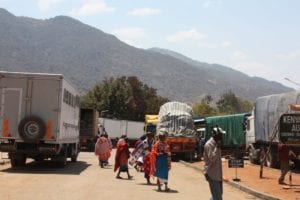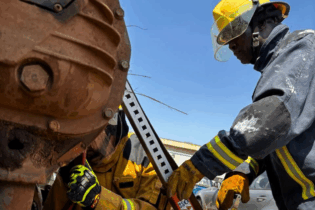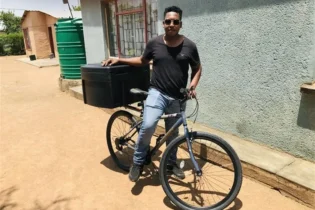Construction activities of Rusumo one-stop border bridging Rwanda and Tanzania are set to be completed by November 2014, costing a shared amount of Frw 25 billion, officials have disclosed.
The project, funded by Japan International Cooperation Agency (JICA), will cover the construction of a new bridge, a 2-kilometre road connecting two customs as well as equipping both sites with necessary tools such as computers, printers, scanners, generators and phones as well as a suitable parking. Honore Munyanshongore, project engineer at Rwanda Transport Development Authority (RTDA), said that the new facility will be installed with capacity to carry 180 tons. The old one was installed with capacity to carry 32 tons 40 years ago, though it now carries over 60 tons due to huge transport volumes increased over the years. “This is a very important project for our two countries,” said Monique Mukaruliza, the Minister in charge of the East African Community affairs (Mineac). “There will be enhancement of cross-border trading and fast service delivery once the one-post service gets operational.” She was heading the ministry’s delegation to visit the border and assess the progress of implementation of some protocols signed by five partner states of the bloc. It was a part of series of activities dedicated to mark the EAC week; along which the ministry has been raising awareness about regional integration. For the Minister, achievement of the new bridge with high capacity as well as the stepping up one stop border post will be crucial infrastructure needed in turning into reality the agenda of the regional integration. In practical sense, the ‘one post’ service will see both Rwandan and Tanzanian customs officials share the same office and scanner in both sides in order to reduce costs of operations. This will positively affect services provided by migration, revenue authority and standards body among other services offered at the border. As of today’s records, more than 100 vehicles cross the border every day. Officials at the border working with Rwanda Revenue Authority say that one vehicle can be serviced in 10 minutes; which makes imperative to maximize working hours. Currently the border operates from 6 am to 10 pm – or 16 hours a day.
Intensifying bilateral talks
Whatever the progress made at the border, Rusumo still lags behind in terms of implementing customs union agreement. At Gatuna between Rwanda and Uganda, for instance, operations are better than at Rusumo, noted the minister. A 24-hour One-Stop border point and simplified trade regime have been operating since 2010.
“Gatuna is more in progress than here (Rusumo),” noted the Minister, adding they got an idea, as they were looking at the progress, on how to make things better. “Our mandate is to facilitate people on both sides to do their business in suitable and easy conditions,” she pointed out.
Among options to undertake, the Minister suggested, include intensifying bilateral talks with their Tanzanian counterparts so that they step up the implementation of the regional integration agreements.
Apparently, much effort is still needed to tie collaboration between both sides if they are all to strengthen regional integration. The collaboration can be cultivated starting with the current situation; from the joint project where progress is noted to be at different levels. Hitoshi Kameda, the chief engineer at Chodai Co., Ltd, the supervising company, noted that they are at a 3.5-month delay at Tanzania’s side. “There are everyday stoppages. This is a problem for us,” he noted. “There is one project, but we have two clients.” “There will be enhancement of cross-border trading and fast service delivery once the one-post service gets operational.” At Rwanda’s side, expropriation has been done at 99% while at the other side residents are still waiting for payment. The supervisor also noted that they face a serious challenge of lack of electricity at Tanzania’s side while they would be working even over night to meet the deadline. They only use solar energy, which is not sustainable for such works. These are factors that would hamper the project implementation in particular and the intended collaboration in general unless the bilateral arrangement is successful. But Mukaruliza said that they have already engaging involved authorities through bilateral corridors to jointly handle issues that might slowdown the regional integration in a bid to facilitate free movement of people and goods. Source: http://allafrica.com





